A leaked document from behind the scenes of the Kremlin’s presidential administration reveals Russia’s plan to bring Moldova under its own umbrella by 2030. The document, which has not been made public, is called „The Strategic Objectives of the Russian Federation in Moldova” and was created in 2021. Several key points from Moscow’s strategy have also appeared over the years in the public manifestos of pro-Russian parties and in politicians’ speeches.
„It’s an interesting document, but it shows that they are one step behind the general situation due to the war in Ukraine and the regional capacity of EU countries and other international organizations to mobilize and counter Russia’s intentions to achieve this [goal]”, says Sergiu Diaconu, chief of staff of the Moldovan Prime Minister, while commenting on the strategy we showed.
Against the backdrop of the Russian invasion of Ukraine, the government in Chisinau has been increasingly pushing for Moldova’s approach with the European Union. Recently, the head of state also set a deadline for this objective: by year 2030.
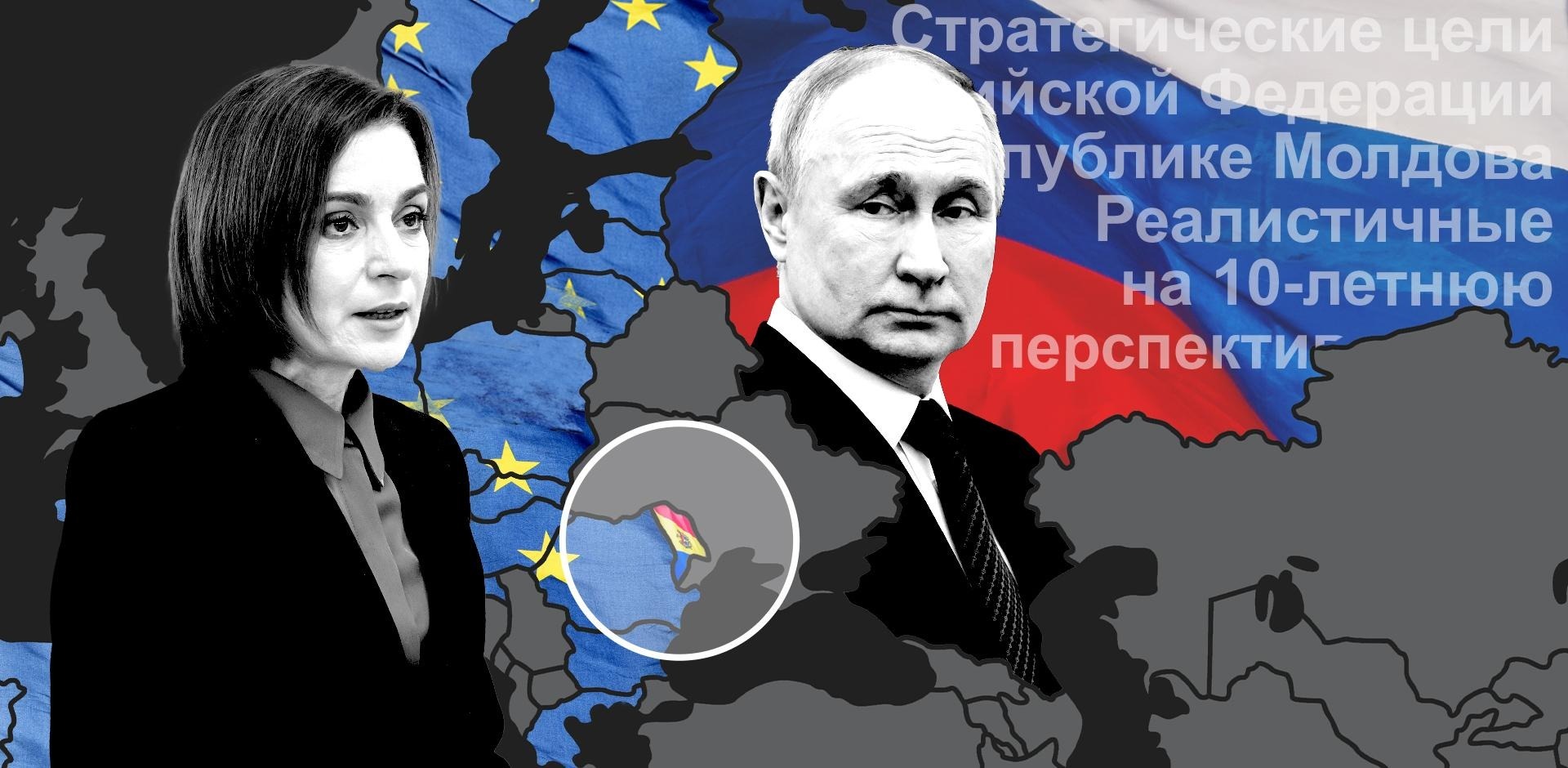
Karl-Erik Leik / Delfi Meedia
This year – 2030 – is also mentioned in Russia’s strategy as the deadline for gaining control over Moldova and forcing it to estrange itself from the EU, NATO, and other partners.
Moscow’s detailed strategy document was obtained by RISE Moldova in collaboration with an international consortium of journalists that includes Yahoo News, Delfi Estonia, the London-based Dossier Center, The Süddeutsche Zeitung, The Kyiv Independent, the Swedish newspaper Expressen, the German radio network Westdeutscher Rundfunk and Norddeutscher Rundfunk, the Polish investigative outlet Frontstory, the Belarusian Investigative Center, and the Central European news website VSquare.
The document comes from the same Presidential Directorate for Transborder Cooperation that crafted a similar strategy regarding Russia’s plans to annex Belarus. The Moldovan strategy was elaborated in the fall of 2021, just like the strategy for Belarus, with the contribution of the Russian General Staff and Moscow’s special services: FSB, SVR, and GRU. „There is zero percent [chance that] these documents are fake”, according to the source who shared with us the document.
The strategy was constructed on three areas to project Russian soft power: political and defense, economic, and humanitarian.
PRO-RUSSIAN GROUPS OF INFLUENCE IN POLITICS AND BUSINESS
Strategic objectives in the political, defense, technical-military, and security spheres
In the short term (until 2022), Russia intended to open a consulate in Gagauzia, something that has not happened. The idea of establishing a Russian Consular Section in Comrat was proposed by former president Igor Dodon as early as 2012. At that time, Mr. Dodon was a member of the Parliament.
In 2021, an initiative group began collecting signatures in support of this idea, arguing that „Many Gagauzian residents have Russian nationality and have a source of income in that country. Many people from the autonomy are married in Russia, or have businesses there. We are connected to Russia by many threads.”
Mihail Vlah is the chairman of the Supervisory Board of the public broadcaster Teleradio Gagauzia (GRT) and a co-organizer of protest rallies against price hikes in the summer of 2022. His wife, Tatiana Vlah, owns 67% of Bakayan, one of Moldovan firms which Russia’s agricultural watchdog Rosselkhoznadzor had granted permission to export to Russia in December 2022, following an embargo on all Moldovan agricultural producers but Transnistrians in August. Mr. Vlah denies any connection between the rally and the reinstatement of Bakayan’s export permit.
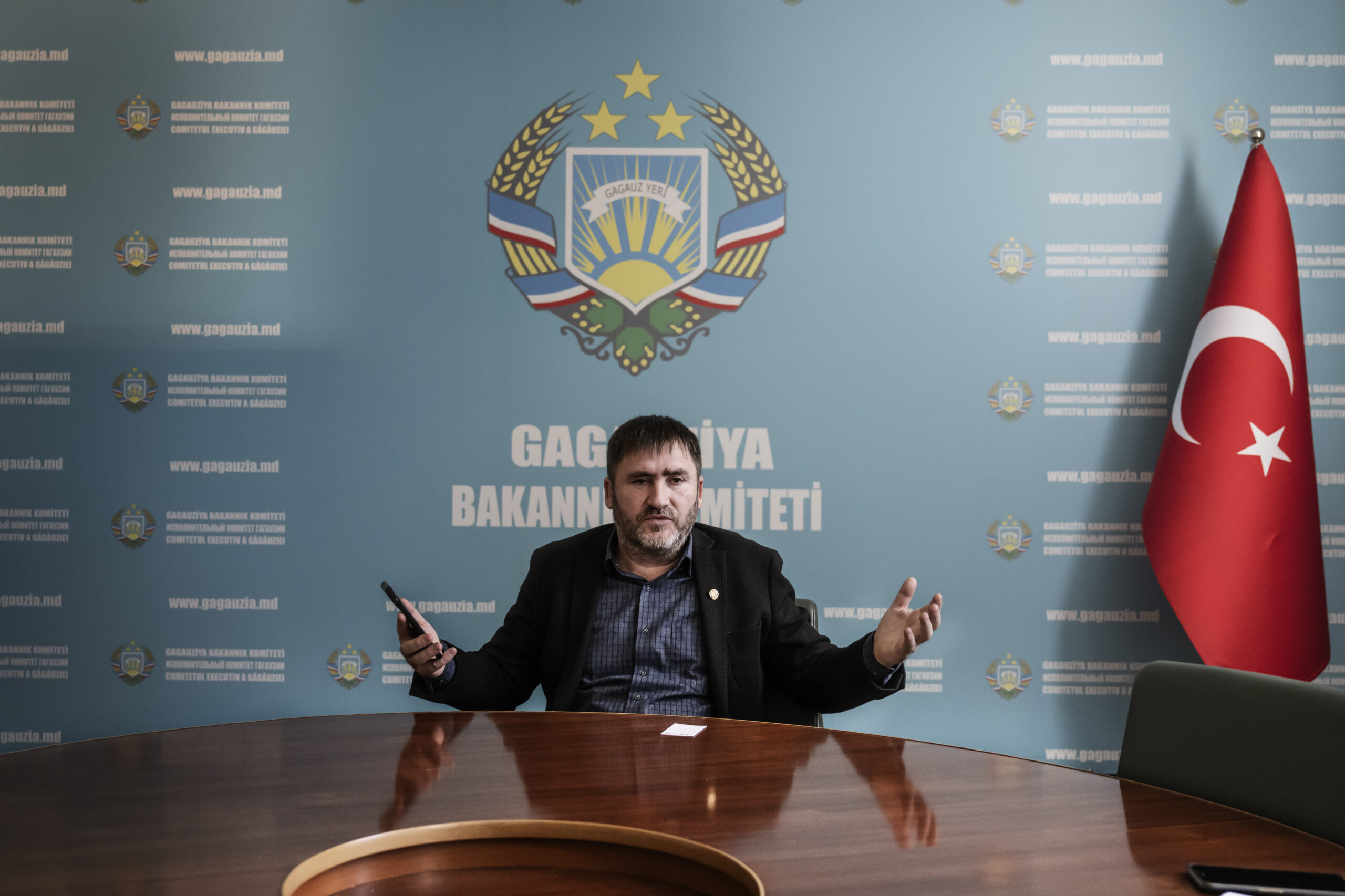
Mihail Vlah. PHOTO: Anna-Karin Nilsson
Mihail VLAH, a civic activist in Gagauzia: I believe that, in general, Russia is not interested in Moldova. For Russia, what happens in the Transnistrian region is very important, because about 50% of its residents hold Russian citizenship, [because Russia] keeps weapons and there are peacekeepers there. Regarding Moldova as a whole, I think that Russia naturally would like to see Moldova within its sphere of influence. Just as Europe and America would like to see Ukraine, Moldova, and Georgia in their sphere of influence. And Russia doesn’t want anything from Gagauzia. We live just as poorly as the rest of Moldova. We pay 30 lei for gas and 5 for electricity. Our products are not delivered to the Russian market. Like our Moldovan brothers, we are hurt by the war in Ukraine and by the [severe] relationships between the authorities of the Republic of Moldova and the authorities of the Russian Federation.
Another objective of the Russian Federation is „Countering Moldova’s cooperation with NATO,” which it aims to achieve by 2025. And in the long term, by 2030, Russia wants to „form a negative attitude towards NATO within Moldovan society and in political circles.” This was one of the „10 primary objectives” which the Moldovan Party of Socialists (PSRM) pursued during the February 2019 parliamentary elections: „We shall resist any NATO membership and we are going to close the NATO information office in Chisinau.”
„Countering Romania’s expansionist policy in Moldova” is a medium-term objective of Russia, which wants it achieved by 2025. During the same 2019 elections, PSRM vowed to ban all “unionist parties and movements”, should it succeed to earn a majority vote. The Socialists also promised to drive Moldova into „full membership in the Eurasian Economic Union” (EEU). This objective is also present in Russia’s strategy on Moldova.
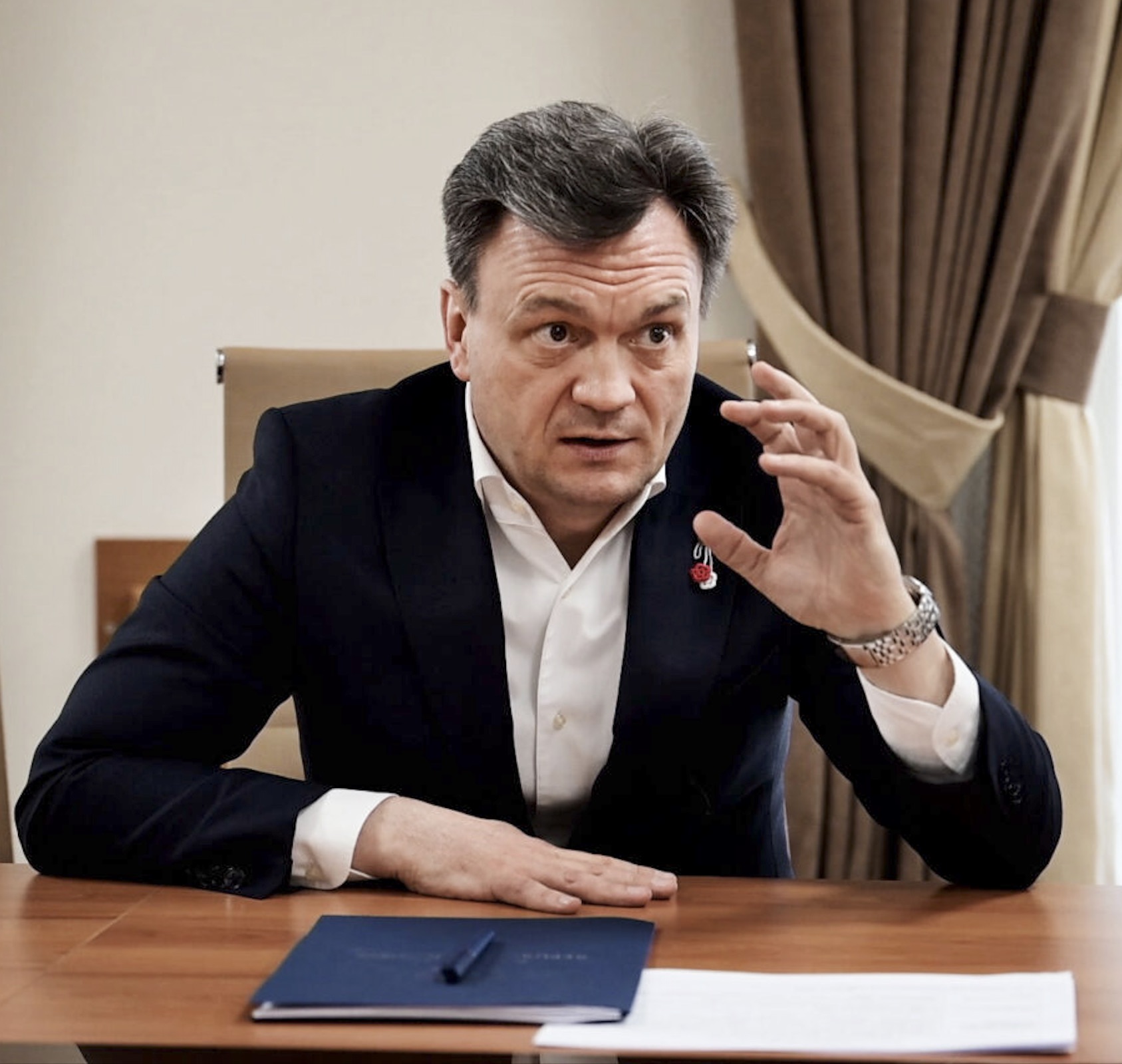
Dorin Recean, the prime minister of Moldova. Chisinau 2023. PHOTO: Anna-Karin Nilsson
In continuation to Russia’s political, defense, technical-military, and security objectives, it also aims to „broaden the electoral base of Moldovan political forces that advocate for constructive ties with the Russian Federation,” […] „create stable pro-Russian groups of influence within Moldova’s political and economic elites,” […] „develop partnerships in the political-military sphere, including intensification of Russian-Moldovan contacts between the armed forces and the law enforcement agencies,” and „boost Moldova’s participation in CIS activities, including the return of Moldovan representation in all formats of the Commonwealth, as well as EEU activities”.
Moldovan Prime Minister Dorin Recean says: From a military perspective, at the moment, they [Russians] do not have the resources or circumstances to do much about it. They cannot advance towards Transnistria. They are not well aligned. But they keep trying to seed more uncertainty, more fear and anxiety, and they are funding protest rallies and various types of destabilization, this is what they are trying to do. And it coincides with these groups’ agenda, though normally they should be in jail and their money should be seized by the government, because it’s the money they had stolen from people.
„Russia sees a trustworthy partner in the Shor Party”
A party that acts in compliance with the Russian agenda in Chisinau is Sor Party. It is led by Ilan Sor [pronounced: shor], a convicted fugitive, and has publicly expressed its sympathy for Moscow. Alongside socialists and communists, Mr. Sor has repeatedly spoken out against NATO, even implying that the country’s close ties with this political alliance could lead to a war with Russia.
„As if it’s not clear how our traditional partners in the East would react to us dumping our neutral status and joining NATO. Do we want a war? Maybe it’s time to tell this witch [Maia Sandu] to stop importing NATO troubles to our peaceful land,” Ilan Sor said in early 2023.
As Russia launched a full-scale war in Ukraine, Mr. Sor expressed support for the aggressor and campaigned against EU sanctions. „In the case that [Moldova] supports the sanctions against Russia, I’ll keep the right to rally people into the streets,” Mr. Sor said in Facebook video address.
Moreover, as early as 2021, the Sor party faction in the Parliament promised to establish collaborative ties with the United Russia party, which has kept a tight grip on power in Russia for more than a decade. The Sor Party quoted in a statement the chief of the Foreign Affairs Committee in the State Duma (lower chamber of the Russian parliament), Leonid Slutsky, as saying that „in recent years, the absence of a reliable, long-term partner for our big companies in Moldova was a big issue” and “today, it’s Ilan Sor and the Sor Party to embody the partner we were looking for.”
The United States has slapped Ilan Sor and his party with sanctions for acting as Russian agents in Moldova. „In advance of the 2021 Moldovan elections, Russia planned to undermine Moldovan president Maia Sandu and return Moldova to Russia’s sphere of influence. To support this effort, Sor worked with Russian individuals to create a political alliance to control Moldova’s parliament, which would then support several pieces of legislation in the interests of the Russian Federation,” according to a statement issued by the US Treasury in October 2022.
We interviewed Marina Tauber of the Sor Party near the Government Building during a Sor Party-sponsored protest rally on Sunday, 12 March 2023. Mrs. Tauber denies allegations that the party has been funded by Russia.
Marina Tauber, a member of the Sor Party faction: No, we are not funded by Russia in any way. I am telling you officially. If anyone tells you this, please ask them to provide proof the claim, to show concrete evidence. Otherwise, I’m sorry, it’s just blah, blah, blah. I cannot be responsible for all the people in the world. If some of our employees have hired someone, they should be made accountable. Mr. Cernautan [Viorel Cernauteanu, chief of the General Police Inspectorate], as I heard from his briefing, said nothing about the Sor Party. If there are provocateurs here, what can I say? How can I make myself clear for you? Look at the people who have made a long journey from various corners in a bid to answer our call. [It’s not my business] what others do, please don’t hold me accountable for their actions.
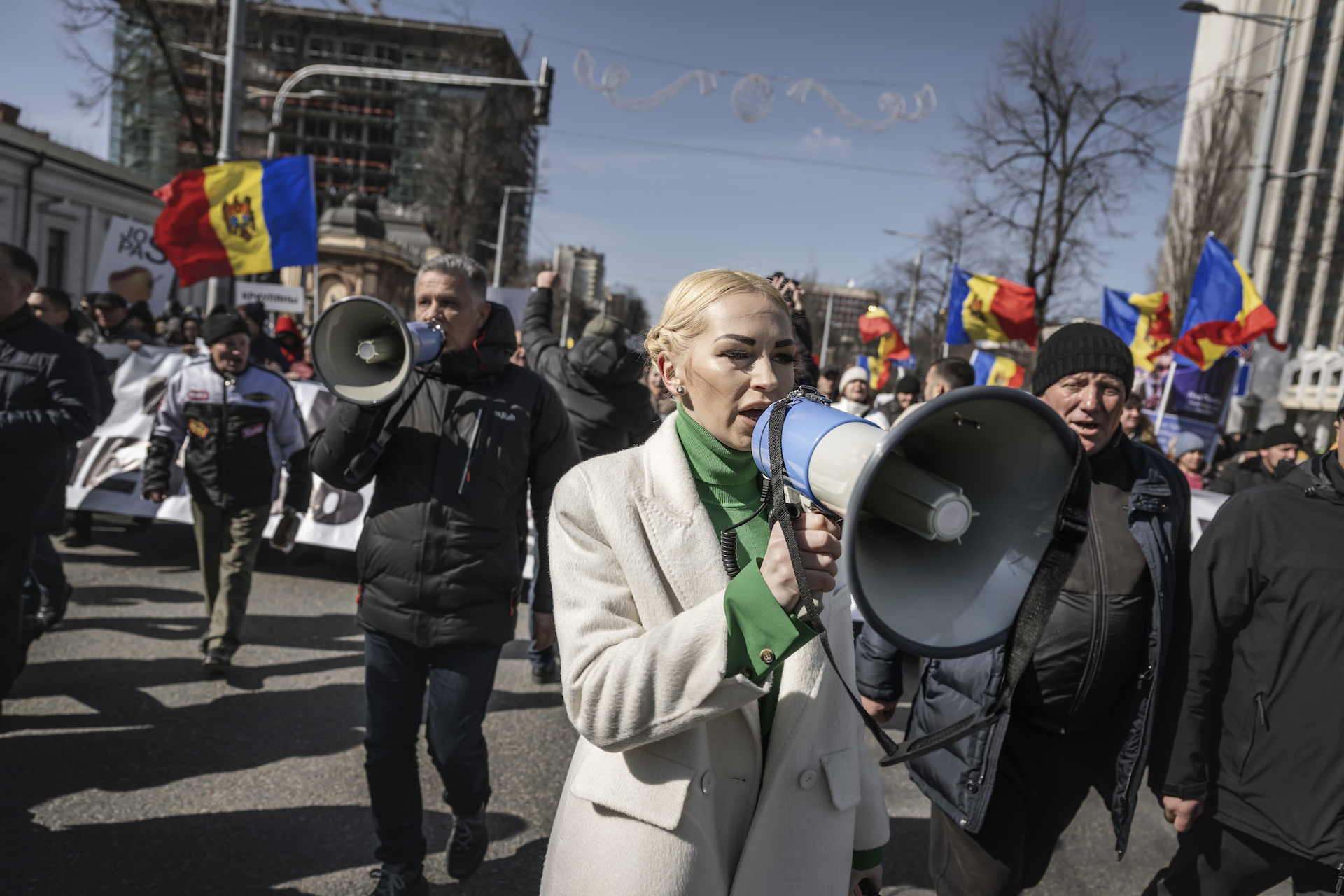
Marina Tauber, at a protest rally organized by the Sor Party on 12 March. PHOTO: Anna-Karin Nilsson
PRO-RUSSIA NGOs, SUPPORT FOR CHURCH AND SPECIAL STATUS FOR RUSSIAN LANGUAGE
Strategic objectives in the humanitarian sphere
By 2025, Russia seeks to create in Moldova a network of „NGOs that are concerned with developing Russo-Moldovan relations”, and providing „organizational, financial, legal, and informational support for Russia-friendly NGOs”. An NGO of this kind was founded in 2021 by Igor Dodon.
RISE Moldova wrote about the „Moldovan-Russian Business Union” of the former president in the investigation „Russian money for Dodon”, in which we revealed that from October 2021 to April 2022, in just seven months, more than 20 million Russian rubles (approximately five million lei) landed onto the Moldovan association’s bank account. The money came from a Russian organization called Delovaya Rossija, which is funded by businessmen close to the Kremlin and represented in Moldova by Igor Chayka, the younger son of Yuri Chayka, Russia’s prosecutor-general in 2006-2020.
In the same humanitarian sphere, the plan outlines the objective of „ensuring that the Moldovan authorities will drop the idea to kick out the study of Russian in schools” and „reconfirming the status of Russian as a language of interethnic communication.” Granting a special status to the Russian language in Moldova is also present in the political manifesto of the Socialists and Communists’ parties. In their latest political statement, approved in 2021, PSRM „advocates for strengthening the legal framework regarding the status of the Russian language as an interethnic communication language throughout Moldova.” And PCRM (Communists) too inserted this promise into their electoral agenda: „The national authorities shall strictly respect the rules stipulating that Russian is the language of interethnic communication in our country.” In late 2020, the Socialist-Communist parliamentary majority, backed by a splinter group calling itself „For Moldova” (made up of defectors from the Democratic Party and Sor Party members) passed a law regarding the special status of Russian. Yet, the Constitutional Court invalidated the law, forcing the Parliament to repeal it.
Moldovan young people too have emerged into Moscow’s attention. Russia intended to „expand opportunities for Moldovan students to receive remote education in the Russian language,” to increase the quota allocated by the Russian government to students from Moldova who are willing to pursue free courses at Russian universities.” It also planned to create consortia between „higher education institutions from the two countries,” to open branches of Russian universities in Moldova, and to work up an academic exchange program.
Sergiu Diaconu, chief of the prime minister’s cabinet: It’s an interesting document, and what we know exactly is that it confirms [Russia] will put a lot of pressure on the so-called humanitarian and social area. And here they can genuinely bring damage about us, because they use institutions, including the Russian Cultural Institute here in Moldova, where you permanently can see younger generations, especially from socialist-leaning young people. It’s a sort of enclave for any kind of exchanges but cultural ones. And the most interesting thing about the humanitarian sphere is that they want to increase the number of student organizations and to achieve a greater presence of the Russian language. They also seek to increase their media build-up.
The Russian strategy also targets the church. According to the plan, by 2030 they aim to provide support to the Russian Orthodox Church in “defending the interests of canonical Orthodoxy in the Republic of Moldova.”
Mihail Vlah, a civic activist in Gagauzia, says: „The European Union is a very large and friendly family. It is like an intellectual, [with] brain and technology. And Russia is an Orthodoxy, a close-knitted history of centuries which you cannot break with a hammer.”
MAINTAIN DEPENDENCE ON RUSSIAN GAS
Strategic objectives regarding trade and economic ties
„The maintenance of the volume and legal framework for the supply of Russian natural gases” is an objective in the first paragraph of the strategy’s layout for trade and economy.
Sergiu Diaconu, chief of staff of the prime minister, says: „I would be very happy if the people of Moldova could see this strategy. Because the second point [of the document], which refers to the economic sphere, provides in the short term for the preservation of the same volume of gases they used to supply Moldova, and they succeeded in this regard in 2021. But this year, in 2022, they cut supplies by 40% and keep us permanently under the threat of full cut of gas exports from Russia. We encounter this problem every month – they threat to stop gas consumption throughout the country. So, how does their plan match with what they actually do?”
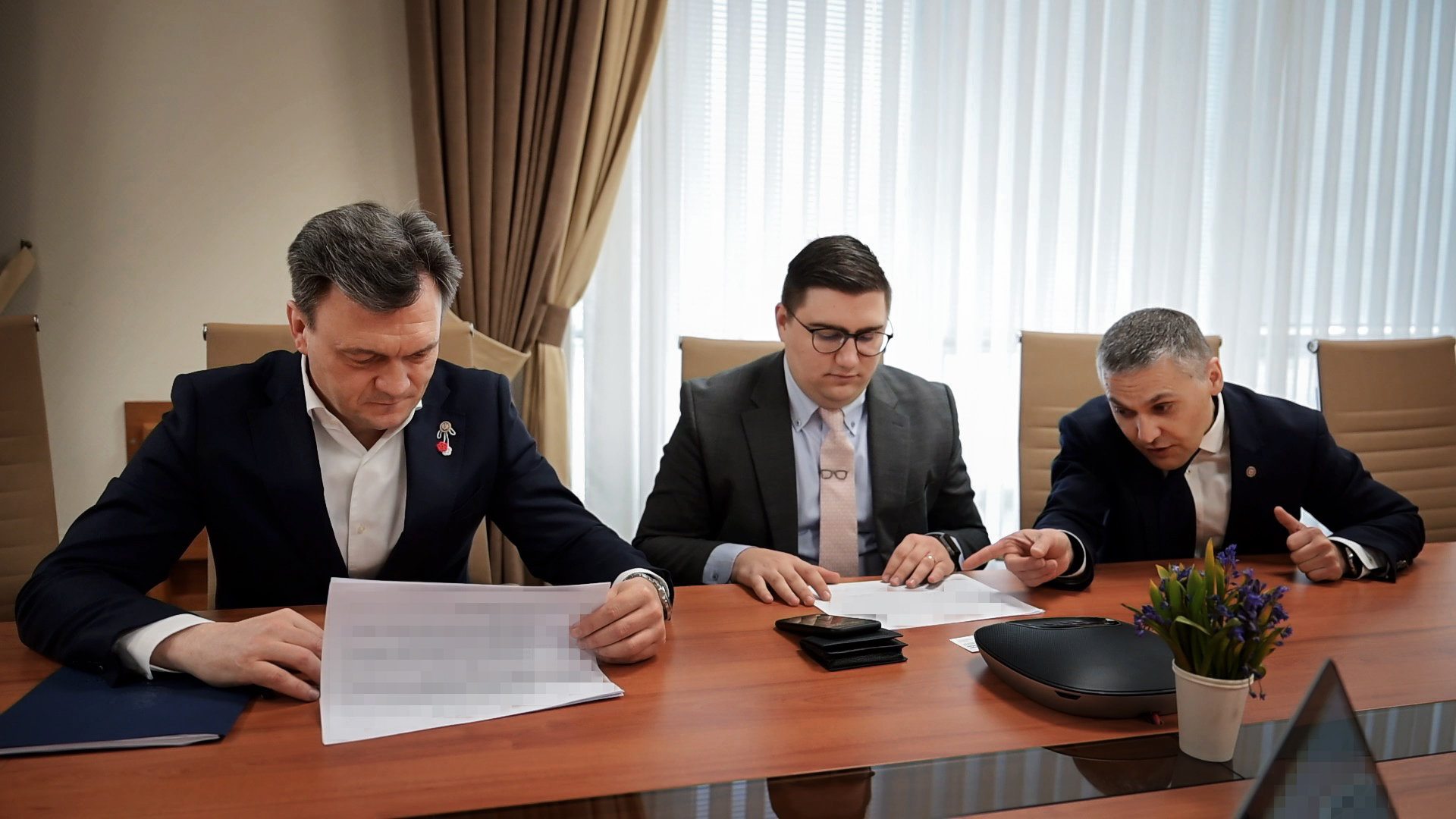
Dorin Recean (left), Daniel Voda (center), and Sergiu Diaconu (right) pictured as reading the Kremlin’s strategy on Moldova. Chisinau 2023. PHOTO: Anna-Karin Nilsson
The objective of expanding „Russian-Moldovan collaboration in the areas of trade and economy, as well as inter-regional ties” is similar to the mission carved in the statute of Mr. Dodon’s organization. The Moldovan-Russian Business Union advocates for a boost in bilateral business relations between Moldova and Russia.
One Moldovan-Russian investment project is “AgroHub Moldova”, a startup in Hincesti, which RISE Moldova covered in a report last March. Specifically, the new firm was about establishing an agri-industrial and logistics hub for the trade with agricultural products and wines. Valued at 55 million dollars, the project was mentioned a protocol of the Moldovan-Russian Intergovernmental Commission meeting on 2 October 2020, and – according to the document – the hub was designed „to improve trade between Moldova and Russia.” However, a few months following the release of RISE Moldova’s investigation, the Moldovan side terminated the contract concerning the lease of public land for “AgroHub Moldova”. Details are available HERE.
RISE Moldova has reached the Socialists Party and the Communists Party for comments whether there were any connections between the political and humanitarian objectives in their statutes and the pretty similar objectives in Russia’s Moldova strategy. None answered by the date we published this text.
Moldova’s Intelligence and Security Service (SIS): There are numerous strategies, scenarios and plans with subversive substrata in the public space, with direct or indirect reference to Moldova, penned by a variety of or pseudo-experts. However, in the most of cases, there are weak perspectives for their enforcement, since they serve mainly to attract generous funding from sponsors or to manipulate the public opinion.
THE KREMLIN’S „MOLDOVAN DIVISION”
The document „Strategic Objectives of the Russian Federation in the Republic of Moldova” was allegedly forged under the guidance of Colonel Igor Maslov of the Russian Foreign Intelligence Service, who led the Kremlin’s „Moldovan bureau” until 2021. We previously discussed about this unit in the Kremlinovich (#Kremlinovoci) series of investigative materials. The sources cited by our partners say that among the contributors to the strategy was a man called Andrey Vavilov, an employee in the „Moldovan Directorate”. Our sources in foreign special services claim that Vavilov’s chief officer is Viktor Lysenko.
Mr. Vavylov and Mr. Lysenko are not just common rank officials in Vladimir Putin’s administration. They ensure communication FSB General Dmitry Milyutin, who is in charge of the Moldovan-Transnistrian intelligence network. We previously discussed about Mr. Milyutin’s role in Moldovan politics in the investigative piece „FSB Agents in Charge of Moldova”.
According to data obtained by RISE Moldova in partnership with the Dossier Center, from November 2021 to May 2022, Mr. Vavylov called Mr. Milyutin three times at least, and Mr. Lysenko is one of the most frequent telephone speakers to the Moldovan coordinator within the FSB. During that period, Mr. Lysenko called the general at least ten times. Only Mr. Milyutin’s wife Natalia called her husband more frequently.
Dmitry Milyutin visited Moldova in 2016, at the time Igor Dodon took office as the new president of Moldova, while Viktor Lysenko was in Chisinau relatively recently. The latter was part of an official Russian delegation led by Deputy Prime Minister Dmitry Kozak, which visited Moldova in June 2019. Yet, Lysenko’s presence was not advertised.
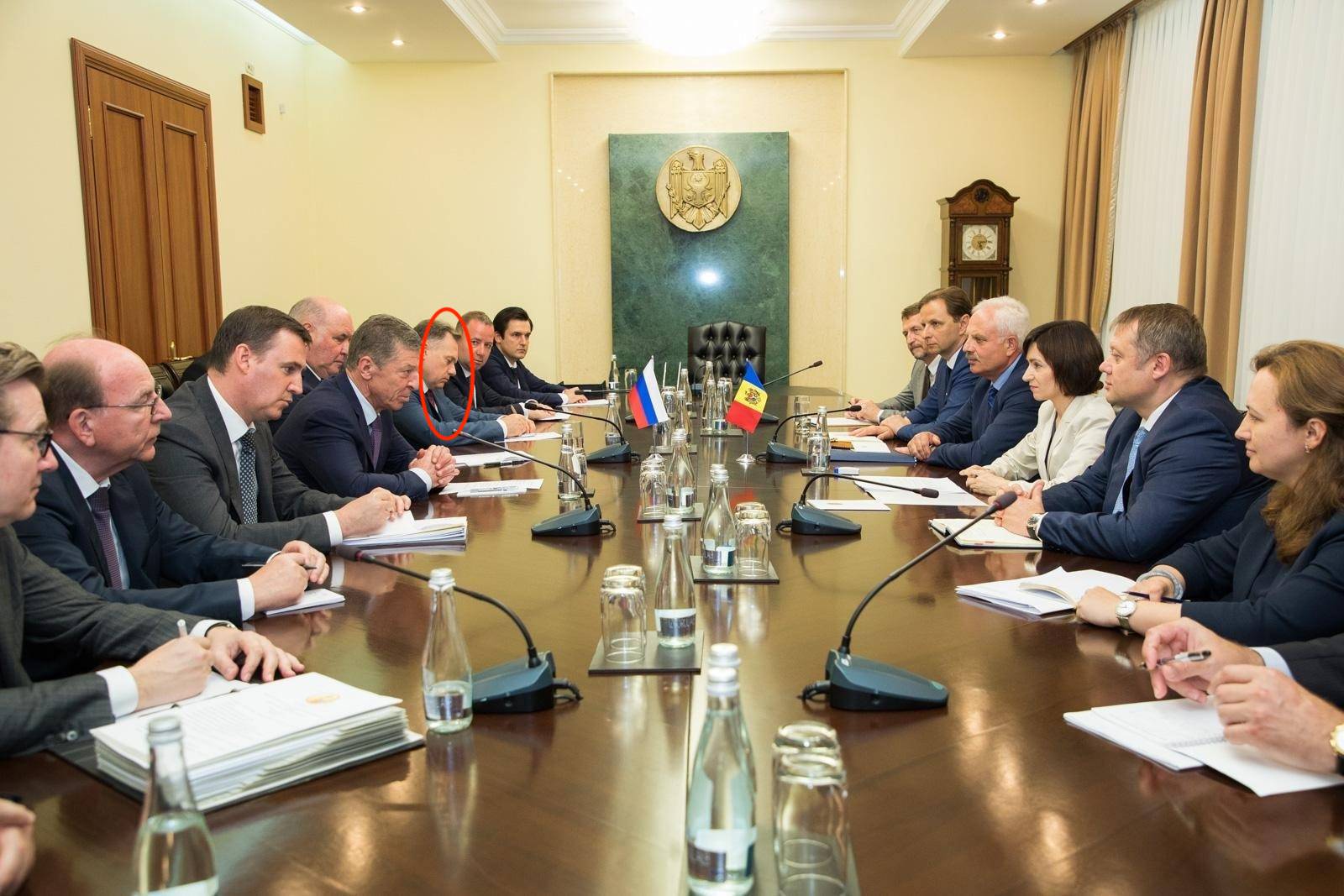
Viktor Lysenko at a meeting with Moldovan and Russian governmental officials. Chisinau 24 June 2019. Photo: gov.md
In Chisinau, the Russian visitors met with Maia Sandu, who was appointed as the new prime minister in a Socialist-led coalition government. Mr. Dodon too met with the Russian delegation. The sides discussed about bilateral trade and Russian gas supply to Moldova; these topics were later added to Russia’s ten-year strategy regarding Moldova.
RISE Moldova reached for Vavylov by phone one day prior to the publication of this investigation. Upon hearing his family name, the man asked:
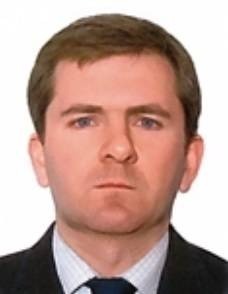
Andrey Vavilov
-Who’s calling?
– I am Vladimir Thorik from Moldova.
– About what?
– I am a journalist at RISE Moldova. I’d like to ask you a question regarding a document envisaging Moldova. It’s called “The Strategic Objectives of the Russian Federation…”
– You… dialed a wrong number. – and the man hang up the phone.
We have sent official enquiries to the Russian Embassy in Chisinau to share more details about Russia’s strategic objectives, particularly which ones have been achieved, but the diplomatic mission never replied.
Marcela ZAMOSTEANU, Liliana BOTNARIUC, Vladimir THORIK, Iurie SANDUTA
Contributions: Nicolae CUSCHEVICI
Fact-checking: Dumitru BACIU




